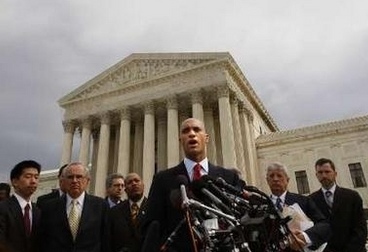US justices agree on right to own guns
(Agencies)
Updated: 2008-03-19 09:06
Updated: 2008-03-19 09:06
WASHINGTON -- Americans have a right to own guns, Supreme Court justices declared Tuesday in a historic and lively debate that could lead to the most significant interpretation of the Second Amendment since its ratification two centuries ago.
Governments have a right to regulate those firearms, a majority of justices seemed to agree. But there was less apparent agreement on the case they were arguing: whether Washington's ban on handguns goes too far.
|
|
The justices dug deeply into arguments on one of the Constitution's most hotly debated provisions as demonstrators shouted slogans outside. Guns are an American right, argued one side. "Guns kill," responded the other.
Inside the court, at the end of a session extended long past the normal one hour, a majority of justices appeared ready to say that Americans have a "right to keep and bear arms" that goes beyond the amendment's reference to service in a militia.
Several justices were openly skeptical that the District of Columbia's 32-year-old handgun ban, perhaps the strictest in the nation, could survive under that reading of the Constitution.
"What is reasonable about a total ban on possession?" Chief Justice John Roberts asked.
Walter Dellinger, representing the district, replied that Washington residents could own rifles and shotguns and could use them for protection at home.
"What is reasonable about a total ban on possession is that it's a ban only on the possession of one kind of weapon, of handguns, that's considered especially dangerous," Dellinger said.
Justice Stephen Breyer appeared reluctant to second-guess local officials.
Is it "unreasonable for a city with a very high crime rate ... to say no handguns here?" Breyer asked.
Alan Gura, representing a Washington resident who challenged ban, said, "It's unreasonable and it fails any standard of review."
The court has not conclusively interpreted the Second Amendment since its ratification in 1791. The amendment reads: "A well regulated militia, being necessary to the security of a free state, the right of the people to keep and bear arms, shall not be infringed."
The basic issue for the justices is whether the amendment protects an individual's right to own guns no matter what, or whether that right is somehow tied to service in a state militia.
A key justice, Anthony Kennedy, seemed to settle that question early on when he said the Second Amendment gives "a general right to bear arms." He is likely to be joined by Roberts and Justices Samuel Alito, Antonin Scalia and Clarence Thomas — a majority of the nine-member court.
Gun rights proponents were encouraged.
"What I heard from the court was the view that the D.C. law, which prohibits good people from having a firearm ... to defend themselves against bad people is not reasonable and unconstitutional," National Rifle Association executive vice president Wayne LaPierre said after leaving the court.
|
||
|
||
|
|
|
|


